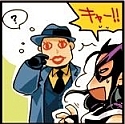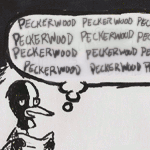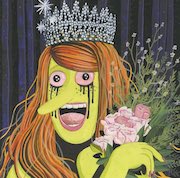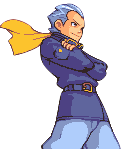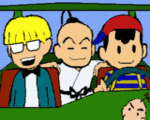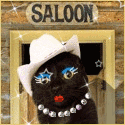- Sheng-Ji Yang
- Mar 5, 2014
-
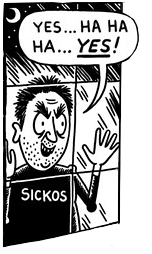


|
pappy lee o'daniel was donald trump before donald trump
quote:THEN, HOWEVER, a twenty-ninth candidate, Governor O’Daniel, entered the race—and any resemblance to Johnson’s first, victorious, campaign ended on the spot.
Until he had run for Governor three years before, W. (for Wilbert) Lee O’Daniel had never had the slightest connection with politics—not as a candidate, not as a campaign worker, not even as a voter; he had never cast a ballot. He was a flour salesman and a radio announcer. He had turned to radio—in 1927—to sell more flour. At the time, newly arrived in Texas, he was the thirty-seven-year-old sales manager for a Fort Worth company that manufactured Light Crust Flour. An unemployed country-and-western band asked him to sponsor it on a local radio station. The Light Crust Doughboys were not notably successful until one day the regular announcer was unable to appear, and O’Daniel substituted for him; finding that he liked the job, he decided to keep it.
He began whistling along with the band. He began composing tunes, and writing lyrics. Then he began writing little poems that he recited himself.
After a while not all the songs were about flour. They were tributes to Texas (“Beautiful, Beautiful Texas,” “Sons of the Alamo”) and to cowboys (“The Lay of the Lonely Longhorn”). There were hymns to an old horse and to “The Orphan Newsboy.” Many were about motherhood: “The Boy Who Never Grew Too Old to Comb His Mother’s Hair” was a particular favorite, as was another which began: “Mother, you fashioned me/ Bore me and rationed me. …” The songs were about current events: when the Lindbergh baby was kidnapped, the Light Crust Doughboys sang (to the tune of “My Bonny”), “Please Bring Back My Baby to Me”; when Will Rogers was killed, O’Daniel wrote: “Someone in heaven is thinking of you; someone who always was loyal and true; someone who used to be close to your side, laughed when you laughed and cried when you cried.” More and more, the songs and poems were about religion—old-time, Fundamentalist, evangelical religion; “It was good for Lee O’Daniel, and it’s good enough for me,” the Doughboys sang.
He began giving short talks that were almost sermons. In 1938, most Texans still lived on farms, and even those farm boys who had recently arrived in the state’s fast-growing cities were still farm boys, whose customs, tastes, vocabulary and view of life were those of country people. This view was simplistic, homespun, and very, very firm. A country boy himself—he had been raised in poverty on farms in Ohio and Kansas—W. Lee O’Daniel understood country people, and he knew how to appeal to their feelings and prejudices. He talked about how poor people should stick together and help each other, about how they should listen to their mothers; while the Doughboys played—pianissimo—“Marvelous Mother of Mine,” he began one program: “Hello there, mother, you little sweetheart. How in the world are you anyway, you little bunch of sweetness? This is your big boy, W. Lee O’Daniel.” And, while the band softly played “Shall We Gather at the River” in the background, he talked about religion: “You young folks who want jobs. You farmers who want crops. All of you folks who want things. How do you expect to get them when you are slapping your Savior in the face?” He urged his listeners to go to church, to love one another, to tell the truth, to avoid sin.
It was not the content of these rambling, informal little homilies that made them so popular, nor the soft violins playing familiar sentimental tunes in the background. It was the voice in which they were delivered. The voice was warm and friendly and relaxed—captivatingly natural. And yet it was also fatherly, soft but firm. It was a voice you could trust. For years, radio experts didn’t understand this. As one reporter put it, they “didn’t think very much of him. They figured it was the band that was putting the program over.” But after a few years, the band broke up, and he replaced it with another, and then another, and the popularity of the show kept growing. In an era in which most radio messages were hard sell, the flour salesman from Fort Worth had, as one chronicler was later to put it, “either stumbled into, or deliberately figured out, that a microphone is an ear and not an auditorium—and you don’t make public speeches to microphones, you don’t shout into them any more than you would shout into your sweetheart’s ear when you wanted to tell her you loved her. O’Daniel learned early that he had Texas by the ear and from that day on he cooed and caroled and gurgled into it.” In 1935, he stopped selling flour for others and started selling it for himself. He organized his own company, Hillbilly Flour, and started his own show. It opened with a woman’s request to him to “Please pass the biscuits, Pappy,” and then, above the fiddles and guitars of the Hillbilly Boys, the voice of a “Pappy,” friendly and fatherly, would be heard. On this show, there was less music and more O’Daniel—and the show’s popularity leaped. By 1938, it had more listeners than any other daily show in the history of Texas radio. Most advertisers wanted their shows to be heard in the evening, when the men were home from work; O’Daniel wanted his show to go on when men weren’t home; he wanted to talk to lonely housewives. And when his show went on, a half-hour past noon, he talked to them. He told them how to mend broken dishes and broken hearts. He told them how important families were. He told them how important they were—because they were mothers. “He talked to the housewives of Texas,” one reporter wrote, “like a big brother and a pal, a guide, philosopher and friend.” And “at twelve-thirty sharp each day a fifteen-minute silence reigned in the State of Texas, broken only by mountain music, and the dulcet voice of W. Lee O’Daniel.” A newsboy who delivered his papers at midday in the little North Texas town of Decatur recalls that in summer his customers’ windows were open, “and you never got out of the sound of the Hillbilly Boys—or of Pappy’s voice.”
Studio technicians who saw his show up close, and who saw him turn on, in an instant, laughter or tears, said, “He’s just a born actor”; at the same moment in which he was bending into the microphone, intoning, in an emotion-choked voice, a tribute to an aged mother or an old horse, he might be imperiously motioning the band into precisely the right distance from the microphone for the background music it was playing. And, indeed, doubts about Pappy’s sincerity were occasionally raised in print by commentators who noted that the first of his fervent paeans to Texas had been composed when he had hardly arrived in that state, having previously lived in Kansas, and that even now he was occasionally prone to minor errors about Texas history—such as confusing the Battle of San Jacinto with the Alamo. Those closest to him knew that his country-boy image was a pose; he was actually a business-college graduate and a businessman who dealt not just in Hillbilly Flour but in Fort Worth real estate; by 1937, while he was telling his listeners that he was a “common citizen,” poor like them, his net worth had passed half a million dollars. Intimates also had some doubts about the depth of his religious feeling; although he was constantly urging his listeners to go to church, he seldom went himself. (Similar doubts were felt by one visitor to Pappy’s radio studio. While the band was playing “That Old Rugged Cross,” O’Daniel leaned over to the visitor and whispered, “That’s what brings ’em in, boy. That’s what really brings ’em in!”) But O’Daniel’s listeners, mesmerized by that friendly, sincere voice, had no doubts. They bought whatever he was selling. Hillbilly Flour was no different from any other flour; in fact, O’Daniel did not even manufacture it himself, simply buying flour ready-made from other mills and packing it in his bags. (He had designed the bags himself; in huge black letters, they bore the word guaranteed [against what, the bags didn’t say]; they were also stamped, in vivid red, with the words, “Pass the biscuits, Pappy”; under that motto was a picture of a billy goat and a stanza he had composed: “Hillbilly music on the air/Hillbilly Flour everywhere;/ It tickles your feet, it tickles your tongue;/ Wherever you go, its praises are sung.”) Soon, Hillbilly Flour was selling so fast that other millers realized that the surest way to sell their product was to let Pappy sell it as his own—which he was pleased to do, taking a hefty royalty on every bag. Pappy’s listeners bought not only his flour but his suggestions; when he urged childless couples to adopt an orphan or two, every orphan asylum in Texas was shortly out of stock. And in 1938, on Palm Sunday, he asked his listeners if he should run for Governor. A blind man had asked him to do so, he said, and he wished they would write and tell him whether or not he should. He received, he said, 54,449 replies. All but three told him to run; these three said he shouldn’t—because, they said, he was too good for the job.
O’Daniel’s candidacy was not taken seriously by politicians or by the press, which noted his total lack of political experience (since he had not paid his poll tax, he was not even eligible to vote); reporters treated it as a joke, if they mentioned it at all; newspaper articles lumped this “radio entertainer” and flour salesman, who had announced that he would campaign (with the Hillbilly Boys) in a red circus wagon, with the numerous other fringe candidates who regularly people Texas politics. Then the campaign began. O’Daniel’s first rally was held in Waco. When he drove up in the red wagon, the crowd waiting for him was possibly the largest crowd in the history of Texas politics—tens of thousands of people. Then the red wagon moved on to San Angelo, where one of Pappy’s leading rivals, a veteran of thirty years in politics, was to draw 183 people to the Courthouse lawn. When Pappy arrived, 8,000 people were standing on that lawn.
His opponents, and the state’s entire political establishment, concluded, as did the press and indeed most sophisticated and educated Texans, that the crowds had been drawn by the Hillbilly Boys, who were by now a popular country-and-western band starring banjo player Leon Huff, the “Texas Songbird”; for the campaign, a vocalist, “Texas Rose,” had been added along with O’Daniel’s sons, Pat, a fiddler, whom he called Patty Boy, and banjo-playing Mike (Mickey Wickey). People were coming to Pappy’s rallies for entertainment, politicians said; they weren’t coming for politics. The politicians were unable to take seriously a candidate who said his only platform was the Ten Commandments, who hadn’t paid his poll tax, who was only barely a Texan, and who wasn’t even a Southerner—who was, in fact, a carpetbagger from Kansas.
But the crowds weren’t coming only for the band, they were coming for Pappy; “for years he’s been talking to us on the radio,” an elderly farmer explained. “He’s been telling us things we like to hear because listening to ’em makes it seem easier to us to be poor folks.” He was hours late for one rally, and a thunderstorm was raging at the site; for hours, 20,000 people stood in the rain waiting for him. When the circus wagon pulled in, the band played for a while under a big umbrella they had set up, but when Pappy stepped up to the microphone, he took it down. “If you folks can stand in the rain and listen to me, I sure can stand in the rain and talk to you,” he said—and the roar of the crowd drowned out the thunder. And Pappy turned the politicians’ attacks against them; if the Ten Commandments didn’t satisfy them, he said, he would add another plank to his platform: the Golden Rule. “I didn’t pay my poll tax because I was fed up with crooked politics in Austin and hadn’t intended to vote for anyone this year,” he said. A carpetbagger? Well, he said, he guessed that was true, but it was true for a lot of Texans; almost a million Texans had been born in other states, and the parents of many more had come to Texas from other states. Perhaps his crowning touch was his answer to the charge that he wasn’t a Southerner. The reason he preferred to be known by his middle name, Lee, rather than by his first name, he said, was that his middle name had been bestowed on him in honor of the great Robert E. himself.
One of his uncles had been a Union soldier mortally wounded in the war; during his final days he had been nursed so tenderly by a Southern family that he had sent a deathbed message to his sister that if she should ever marry and have a son, he should be named after Robert E. Lee. And after he had answered all the attacks, Pappy would say he didn’t mind them; remember what the Scriptures say, he would tell his audience: “Blessed are ye when men shall revile you and persecute you and say all manner of evil against you falsely for my sake.” The Scriptures were a significant element of all O’Daniel’s rallies, along with sacred music; his appearances resembled revival meetings more than political rallies. Texas was a wellspring of evangelism, and Pappy O’Daniel was tapping it. A Baptist minister compared him to Moses, because he could lead the nation back to the fundamentals of God and home.
If he had opened his campaign without a theme, moreover, he had two themes now. One of Texas’ most knowledgeable political observers, analyzing O’Daniel’s appeal, said that in part “He sensed the fears and the hopes of people before they actually had them.” One fear that wasn’t hard to sense—among the farm people who were O’Daniel’s strength—was the fear of old age, when they would no longer be able to do farm work. O’Daniel proposed a simple state pension plan: thirty dollars a month to everyone over sixty-five. When he was asked if he planned to raise the necessary funds for this plan—approximately $100 million per year, four times the entire state budget—through new taxes, he said certainly not, and said it to the tune of “My Bonny”:
We have builded our beautiful highways
With taxes from city and farm,
But you can’t pyramid those taxes,
Without doing our Texas great harm.
Questions about financing details were drowned out by that tune, by another he wrote (to the tune of “Let Me Call You Sweetheart”)—“Thirty Bucks for Mama”—and by his Mother’s Day speech lamenting the Legislature’s failure to act:
Good morning, ladies and gentlemen, and hello there, boys and girls. This is Lee O’Daniel speaking. This is Mother’s Day from a sentimental standpoint only. Tired, forlorn, disappointed, and destitute Texas mothers several months ago thought they saw Mother’s Day breaking in the East—but the golden glint preceding sunrise faded and faded again and again until today perhaps the practical Mother’s Day is more obscure than ever before. But from the Texas plains and hills and valleys came a little breeze wafting on its crest more than 54,000 voices of one accord—we want W. Lee O’Daniel for governor of Texas. Why that avalanche of mail? Surely each and every one of you 54,000 folks could not have known that W. Lee O’Daniel is an only living son of one of those tired, forlorn, disappointed, and destitute mothers—a son who had played at that widowed mother’s skirts, while during each day and way into the darkness of the nights she washed the dirt and grime from the clothes of the wealthy on an old worn-out washboard—for the paltry pittance of twenty-five cents per day—and that by that honest drudgery she provided corn bread and beans for her children which she had brought back with her from the Valley of the Shadow of Death.
His second theme was, if possible, even more effective. To his opponents’ charge that since he had no platform, he had no reason for running, he replied that there was indeed a reason; the reason, he said, was them. The principal reason he was running, he said, was to throw them—the “professional politicians”—out of Austin.
This theme touched a deep chord in government-hating Texas, where distrust of politicians had been heightened by the dichotomy between the state’s newfound and rapidly growing natural wealth and the poverty of its government. As one writer put it: “Texas was producing more oil, more gas … and more of a dozen things than any other state in the Union. It was producing more sulphur than all the rest of the world put together. … Under efficient and honest government, it certainly should have had a full treasury.” Instead, the state’s general fund was more than $19 million in the red. The treasury hadn’t been emptied on behalf of its citizens; this state, first in the nation in natural resources, was last, or near last, in almost every significant category—education, library services, pellagra control—of state aid to improve the lives of its citizens. The fault, O’Daniel said, lay in the “professional politicians.” He was no politician, he told his listeners, he was a “common citizen”—one of them. And if he was Governor, he told them, “we” would be Governor. His victory would be the victory of common citizens over professional politicians; his election he said, would be “the election of us. If I am elected Governor of Texas, we will be the Governor of Texas—we meaning the common citizens, of which I am one.”
Press and politicians had predicted that once the novelty of seeing him in person had worn off, O’Daniel’s audiences would get smaller. They got larger: crowds unprecedented in Texas politics—20,000, 30,000, 40,000—came to hear him in the cities. Crowds followed him from town to town. They barricaded the highway to force him to stop and speak to them. The man they saw was entirely unexceptional in appearance. He looked like a typical, fortyish Texas businessman, five-foot-ten and just a little portly, with a close-shaven face, and slicked-down hair. He would generally doff the jacket of his suit and speak in a white shirt and necktie. While his smile was broad, it was not often in evidence; his face was rather expressionless. But when he spoke, the voice was the voice of Pappy. A reporter watched its effect on about a thousand Texans gathered near Raymondsville. “It was amazing,” he wrote. “They were fascinated. It was a typical summer day in the hottest part of Texas and there they stood, dripping sweat and drinking in [his] words. … Next to me … stood a young mother with her baby in her arms and her eyes glued to the face of the speaker. The baby squalled; she opened her dress and put the child to her breast without even looking at it. Every member of that outdoor congregation was equally attentive.” And at the end of each of O’Daniel’s rallies would occur another impressive scene. He asked his audience to finance his campaign. Saying, “We have not one dollar in our campaign fund,” he told his listeners he was giving them “the opportunity to join the people’s candidate against the professional politicians. You had better take that old rocking chair down and mortgage it and spend the money in the manner you think best to get your pension.” Then his sons and his pretty daughter Molly would pass among the crowd holding little flour kegs labeled “Flour; not Pork,” with a slot cut into them. And the audience crowded around his children, pushing and shoving to give dimes and quarters to Pappy. According to the press, the leading candidates in the race were two of the state’s best-known politicians, onetime State Attorney General William McCraw and Colonel Ernest O. Thompson, chairman of the Railroad Commission. McCraw received 152,000 votes. Thompson got 231,000. O’Daniel got 573,000. Polling 30,000 votes more than the eleven other candidates combined, he won the Governorship without a run-off.
With O’Daniel’s inauguration, the shape of his true philosophy became clearer, as did the identity of his true friends. During the campaign, he had repeatedly promised to fight to the finish any proposed sales tax, which would fall hardest on the small wage-earners (or “common citizens”) whom he was allegedly championing; no sooner had he been inaugurated than he tried, unsuccessfully, not only to push through a sales tax (secretly drafted by his oilmen allies and the state’s largest corporations) disguised under a different name, but to make it a permanent part of state government by incorporating it in a constitutional amendment (the amendment would also have permanently frozen—at ridiculously low levels—taxes on oil, natural gas and sulphur). As for his pension plan, he refused to discuss new taxes to pay for it—lest one of the new taxes turn out to be a tax on oil. And with this refusal, his pension plan was effectively dead. Almost totally ignorant of the mechanics of government, O’Daniel proved unwilling to make even a pretense of learning, passing off the most serious problems with a quip; asked once what taxes he was proposing to keep the deficit-ridden government’s head above water, he replied that “no power on earth” could make him say. Ignoring Democratic party machinery, he tried to appoint to key government posts either men with absolutely no experience in the areas over which they were to be given authority or reactionaries, including members of the Jeffersonian Democrats, an extremist group that had bitterly opposed Roosevelt’s re-election in 1936. He offered few significant programs in any area, preferring to submit legislation that he knew could not possibly pass, and then blame the Legislature for not passing it. He vetoed most significant programs passed by the Legislature. The Legislature in return rejected many of his nominees. His problems were exacerbated by his personality: that of a loner. Walking between the Governor’s Mansion and the Capitol, he kept his head down to avoid having to greet passing legislators. (The legislators were not particularly anxious to greet him; one reporter, watching the Governor on his walks, called him “the loneliest man I ever saw.”) The state’s government was all but paralyzed.
https://www.youtube.com/watch?v=w2RlFA8tSq0
|





 I can understand them not getting the 88, but holy gently caress the Celtic Cross is obvious
I can understand them not getting the 88, but holy gently caress the Celtic Cross is obvious







